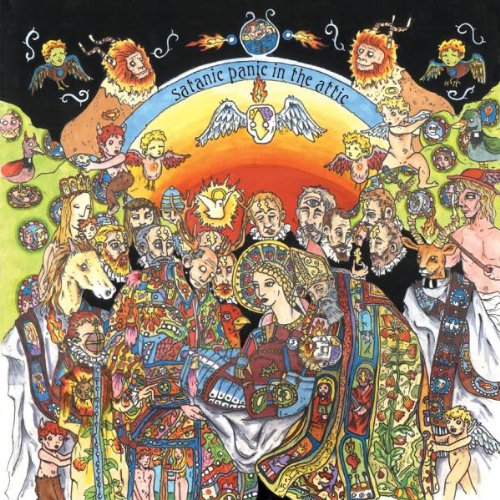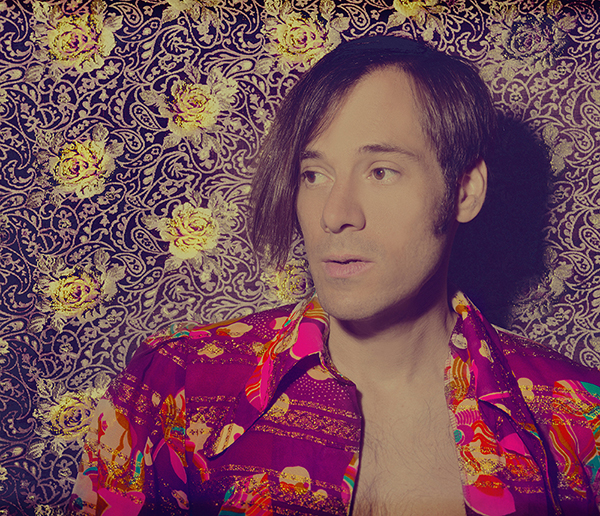Many years ago, when describing Of Montreal’s brilliant and fanciful 2004 album Satanic Panic in the Attic to a friend, I landed on a rather lazy analogy. “It’s kind of like a dancier version of The Beatles, but on acid,” I said.
“But Sam,” he added. “The Beatles were on acid.”
“Fine,” I retorted. “They sound like The Beatles on more acid.”
Like I said, it was pretty lazy. Doubly so when you consider that the depth and breadth of The Beatles’ catalog defies categorization in its own right, and triply so when you consider that the same can be said for Of Montreal.
Nevertheless, my understanding of the Athens, GA indie-pop outfit has always been tied up in the group’s psychedelic leanings. From their dense, textural melodies to their surrealist album art and often indecipherable song titles, there is a lot going on that could fall under the umbrella of “trippy.” Even the band’s lyrics–which dive into varied subjects like politics, sexuality, philosophy, mental illness, consumerism and the minutiae of daily life–seem to indicate a manic madness that, at the very least, sounds like it may have been illicitly influenced.
That’s why I was surprised, and pleasantly so, to hear that I had been wrong all along. While I’m not entirely sure that I believe Kevin Barnes, the frontman and all-around creative force behind Of Montreal, when he tells me psychedelics have played no part in inspiring his music, I sure hope he’s telling the truth. That the myriad sonic layers and lyrical themes that permeate his 13+ albums could come, more or less, from the unfiltered mind of one man makes the whole thing that much more interesting. It makes the whole thing that much more mysterious.
Of Montreal will bring their–you guessed it–psychedelic live show to the Howlin’ Wolf in New Orleans this Wednesday, November 11. The band will be wrapping up a second tour in support of their latest album Aureate Gloom at the venue, so you can count on one hell of a show. I caught up with Barnes last week to discuss the new record, his songwriting process, the state of music today and more.
How has the tour in support of Aureate Gloom been going?
It’s been great. This is basically the second time out in support of the record. It’s a little bit different this time. When the album was brand new, we mostly played songs of the new record at that point. At this point, we’re mixing it up a lot more. There’s old material and new material.
When I’ve seen you guys in the past there have been a lot of crazy theatrical elements. One time, in New York, you brought Susan Sarandon out to spank someone on stage. Will there be any of that kind of thing–well, maybe not Susan Sarandon–in New Orleans?
Susan Sarandon, no I don’t think she’ll be there. But definitely, there’s a lot of theatrical stuff happening. And the visual production, the visual production is pretty intense and transportive. So that side of it is definitely alive and well.
Do you have any history with New Orleans?
Yeah, definitely. We’ve played there many times now and we always have a great experience. The audiences are always really fun. It’s perfect because it’s the last of the tour so it’s a great way to wrap things up.
Of Montreal has released an album almost every year for some time now. Have you started working on the next one?
We’re pretty deep into it at this point. We have maybe 11 songs that are pretty much done. There’s still a few months left to work on it, so I don’t think it’ll come out until the end of summer next year.
I’ve been a pretty big fan for over a decade now, and I’ve always wondered what it is that influences you. Your music covers so many varied themes–politics, sexuality, depression, religion, etc. Where do you draw inspiration?
Just life, you know. As I live, I document it.
Have psychedelics played any role in your music? How much?
None whatsoever. I’m usually sober, completely sober, when I’m creating things. So I haven’t really experimented much with that. I have no problem with other people doing it, but the few times that I’ve tried I get too distracted and I can’t focus. I haven’t experimented with that too much, so it’s better for me to stay pretty sober when I’m working.
For sure. I guess I was just thrown off by song titles like “Lysergic Bliss” and the album artwork, things that have a certain psychedelic ring to them.
Oh yeah. But, it doesn’t mean anything. (Laughs).
Can you talk a little bit about your songwriting process?
It’s always different. Sometimes it starts simple, with a simple idea. Then as the idea evolves and I become excited about moving it in different directions things sort of happen organically. Once I get the ball rolling, things start to happen pretty quickly. I’ll think about it. I’ll think about it when I go to bed, I’ll think about it when I wake up–”oh I’m gonna change this, I’m gonna add that, that lyric isn’t very good”–it becomes something that I kind of obsess over for a period time. Then when the song feels like it’s done or I’m ready to move on, I’ll say “ok it’s done.”
And this is mostly a solo endeavor?
Yeah, for the most part it’s solo. Sometimes I’ll ask somebody, if they happen to be in the room or whatever, “what do you think of this chord progression” or “how do you think we should arrange this?” The last record I had a lot of help from Clayton, who plays drums in the band now. He and I worked on a lot of the arrangement beforehand and he helped me with pre-production. We demoed everything in my home studio before we went out to Sonic Ranch in Texas where we made the record. So we did a lot of things, just the two of us, putting things together, figuring out how we wanted to arrange things and how we wanted to orchestrate things. Yeah, it’s always different. Sometimes by myself, sometimes somebody else helps me.
In the past you’ve written albums that were from the point of view of a character that you had created. Is that a roundabout way of writing autobiographically? Do you plan to do any more of that kind of thing?
I haven’t really written for a persona in a while. For the last three or four records, it’s been just straight up from my personal life. So I haven’t really felt the need to have that sort of device, or that writing tool or whatever, of creating a persona because my own life is something I’ve wanted to explore and document. Not live in a fantasy, not create a fantasy world.
As someone who’s always been very forward-thinking in their music, what do you think about the state of music today. Where do you see things going?
I think it’s kind of impossible to say what the state of music today is because there’s so many different kinds of things happening. You could focus in on any one of them and say, “oh it’s great” or “oh it’s a drag.” As far as generally speaking–people making music, making records, going on tour–I don’t know, it feels a lot better now than it did when we first started out.
There’s good and bad to how accessible music is now. It seems like it’s a bit more disposable now. It seems like people become famous for a second and then disappear. It might be harder now to sustain a career, but at the same time, it’s easier now to get people’s attention or pull yourself out of some obscure hole. Being a band from Athens, GA, it’s definitely cooler now than it was before. Before you had to be a band from L.A. or New York or Chicago or something to get people to know who you are. Now you can come from anywhere and do it in your bedroom. People can still find out about it. So I think it’s good. I think it’s in a good place.
Of Montreal will perform at the Howlin’ Wolf on Wednesday, November 11. Diane Coffee (featuring members of Foxygen) will open the night. Tickets for the show are available here.






